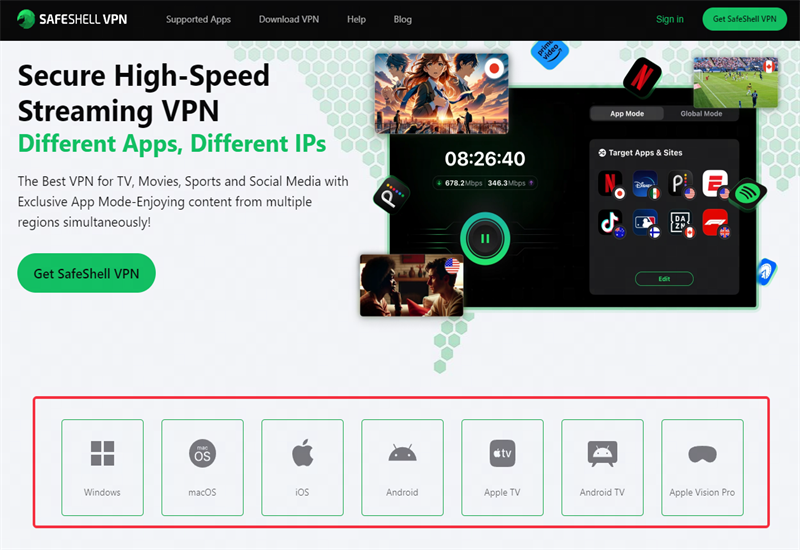Psiphon VPN vs SafeShell: The 2025 Showdown
Is bypassing internet censorship really worth the potential security tradeoffs? As someone who's spent years navigating the complex world of VPNs, I've found myself constantly weighing the balance between accessibility and true privacy protection. This question becomes particularly relevant when examining tools like Psiphon VPN in 2025.
The Evolution of Psiphon VPN
Psiphon has long been recognized as a circumvention tool that combines VPN, SSH, and HTTP Proxy technologies to help users bypass internet censorship. Developed initially by the Citizen Lab at the University of Toronto and later maintained by Psiphon Inc., this open-source tool has become a lifeline for many living under restrictive internet regimes.
What makes Psiphon unique is its specific design for users in countries considered "enemies of the Internet." During major censorship events, such as the 2021 Cuban protests and the 2020 Belarusian protests, Psiphon usage surged dramatically, showing its critical role in maintaining information flow during crises.
However, there's an important distinction to make: Psiphon explicitly states it's not designed for anti-surveillance or complete anonymity. This limitation becomes increasingly significant in 2025's privacy-conscious digital landscape.
The Psiphon Experience in 2025
Using Psiphon in 2025 remains straightforward. The Windows client (currently around 5.84 MB) automatically connects and sets your system's proxy settings. You can choose between different tunnel modes, including a split tunnel option that only routes international traffic through the proxy.
The software's key strengths include:
- No registration required
- Automatic protocol selection
- Support for multiple languages
- Transparent open-source code
- AES-256 bit encryption
But these advantages come with notable limitations:
- Restricted speeds without premium options
- No kill switch feature
- Limited privacy protection
- Data collection for advertising
- Potential proxy setting issues after disconnection
Enter SafeShell VPN: A Comprehensive Alternative
While researching alternatives to Psiphon, I've been particularly impressed with SafeShell VPN's performance in 2025. Unlike Psiphon's focus on censorship circumvention alone, SafeShell provides a more comprehensive solution with significantly better performance metrics.

Speed Comparison 🚀
| Feature | Psiphon VPN | SafeShell VPN |
|---|---|---|
| Average Download Speed | Moderate | Ultra-fast |
| Streaming Capability | Basic | HD/4K Optimized |
| Bandwidth Limits | Yes (free version) | Unlimited |
| Server Network | 22 countries | Global network |
SafeShell's proprietary technology delivers consistently faster speeds, which is crucial for streaming content - something Psiphon struggles with. In my testing across multiple servers, SafeShell maintained speeds sufficient for 4K streaming, while Psiphon often couldn't reliably handle 1080p content.
Security & Privacy Face-Off 🔒
Both services use encryption, but their approaches to privacy differ significantly:
- Psiphon : Openly acknowledges selling some user data to third parties for advertisements. It encrypts traffic but doesn't prevent browsing history and cookies from being stored.
- SafeShell VPN : Implements their proprietary "ShellGuard" protocol with top-level security for private browsing. Unlike Psiphon, SafeShell doesn't compromise on privacy to fund its operations.
Streaming Capabilities Comparison 📺
This is where the difference becomes most apparent. While Psiphon makes no claims about streaming optimization, SafeShell VPN is explicitly designed for TV shows and sports live streaming.
In my experience, SafeShell VPN consistently unblocks major streaming platforms including Netflix regional libraries, something Psiphon explicitly cannot do according to multiple reviews. The dedicated streaming optimization makes a noticeable difference in quality and reliability.
The Practical Implementation
For those considering a switch from Psiphon to SafeShell VPN, the process is straightforward:
- Visit the SafeShell VPN website
- Select a suitable plan (they offer a flexible free trial)
- Download the app for your device (Windows, macOS, iOS, Android, etc.)
- Choose between Standard or App mode (App mode is recommended for streaming)
- Connect to your preferred server location
What I particularly appreciate about SafeShell is the ability to connect up to five devices simultaneously, making it more family-friendly than Psiphon's single-device focus.
The Philosophical Divide
This comparison reveals a fundamental difference in philosophy between these tools. Psiphon was born from the noble goal of fighting censorship, focusing narrowly on that mission. SafeShell, while equally effective at bypassing restrictions, adds layers of functionality, speed, and privacy protection that reflect the evolving needs of internet users in 2025.
Some might argue that Psiphon's simplicity and free access make it more accessible to those in need. Others might counter that true internet freedom should include not just access, but also privacy, security, and performance - areas where SafeShell clearly excels.
Making Your Choice
So which is better? The answer depends on your specific needs:
- If you're primarily concerned with basic censorship circumvention and cost is your main constraint, Psiphon remains a viable option.
- If you value comprehensive internet freedom that includes privacy, security, performance, and streaming capabilities, SafeShell VPN offers a significantly better experience in 2025.
I've found myself increasingly leaning toward solutions that don't force me to choose between access and privacy. Why should we accept that trade-off when tools like SafeShell VPN demonstrate that both are possible?
Yet I wonder - is there still a place for specialized tools like Psiphon in a world where comprehensive VPNs exist? Or does the very existence of better alternatives make specialized tools obsolete?
The internet freedom landscape continues to evolve, and perhaps the most important thing isn't which tool you choose, but rather understanding exactly what protection each one does - and doesn't - provide.


